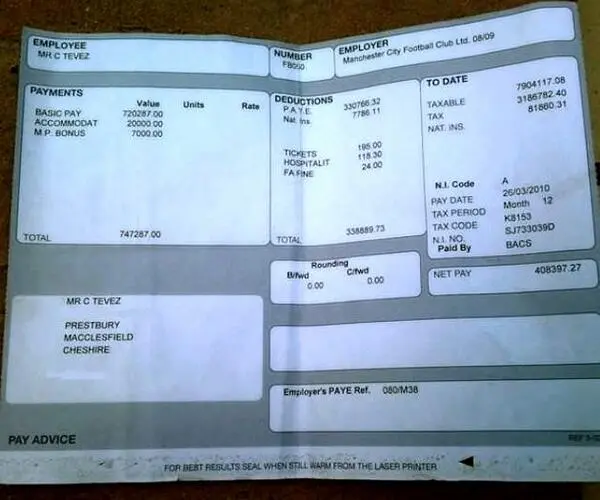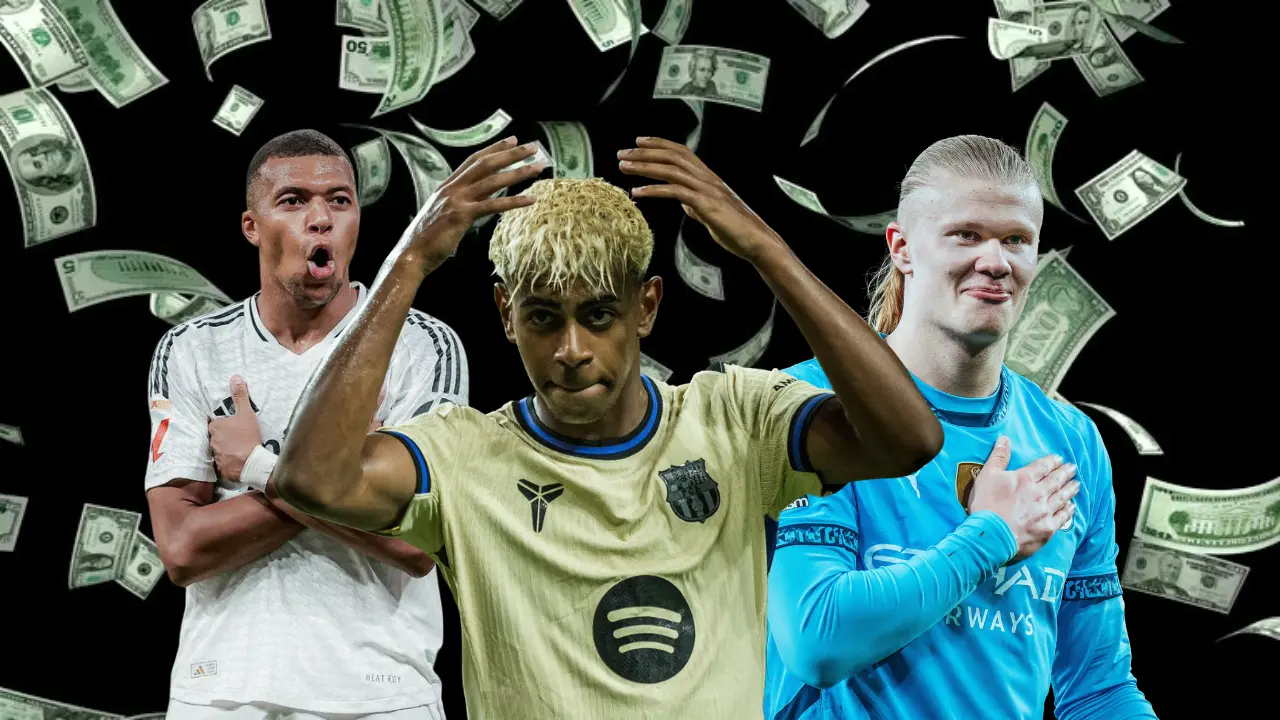Footballers make more money in a week than most people make in a year. Premier League wages average around £65,000 per week — and that’s just the average.
For stars like Jude Bellingham or Erling Haaland, the numbers are sky-high. But here’s the catch: their paycheck isn’t just a simple salary.
Footballer income is a complex mix of wages, bonuses, image rights, taxes, and sometimes even business deals that would make Wall Street bankers jealous.
So, how does it actually work when you’re earning millions just for kicking a ball? Let’s break it down.
Breaking Down Footballer Earnings
Salaries: The Weekly Paycheck

Every footballer signs a contract with their club, and this includes a base salary. Yes, like a “normal” job — it’s deposited into their bank account, often with a payslip.
One famous example was a leaked Carlos Tevez payslip from his Manchester City days. It showed monthly earnings of £720,827, which broke down to about £180,000 a week.
But just like you and me, he still had to pay tax. In the UK, that’s 45% for top earners, so footballers hand over huge sums to the government.
So while fans complain about crazy wages, remember this: footballers are also some of the biggest taxpayers in the country.
Bonuses: The Hidden Goldmine

If salaries are the cake, bonuses are the cherry on top. Contracts often include all kinds of performance-based rewards:
- Goal Bonuses– Mo Salah reportedly gets an extra £2.5 million if he hits 35+ goals/assists in a season.
- Clean Sheet Bonuses– Virgil van Dijk is said to pocket £750,000 if Liverpool hit 22 clean sheets.
- Promotion Bonuses– Ben Foster revealed Wrexham offered £100k to players if the team got promoted.
And then there are loyalty bonuses — huge sums paid if a player simply stays until the end of their contract.
Kylian Mbappé’s battle with PSG was over an €80m loyalty bonus. He won. PSG had to pay up.
Then there are signing bonuses — big payouts players receive when they join on a free transfer. Just ask Kylian Mbappé or Trent Alexander-Arnold.
Image Rights: The Money-Maker Off the Pitch

This is where things get interesting. Image rights cover a player’s name, face, signature, and even their voice. Basically, how their “brand” is used.
At Real Madrid, club president Florentino Pérez famously demands a 50/50 split of image rights with players.
Why? Because being a Madrid player skyrockets your profile — and Madrid wants their cut.
Cristiano Ronaldo changed the game when he sold part of his image rights to Singaporean businessman Peter Lim, who boosted his profile in Asia with deals like that viral Shopee ad.
In England, though, most players keep 100% control of their image rights.
Erling Haaland, for example, runs his empire like a business, funnelling income into his company and paying only 19% corporation tax instead of 45% income tax. Smart, right?
Taxes: Why Players Move Countries
Here’s a secret: tax laws often influence transfers.
- Italy has the “Growth Decree” law — foreign players can pay as little as 25% tax, compared to locals who pay 43%. That’s why players like Aaron Ramsey and Cristiano Ronaldo found Juventus so attractive.
- Middle Eastern leagues like Saudi Arabia? Even better. Many contracts are tax-free, meaning players keep every penny of those giant wages.
- UK? Brutal at 45%. Jordan Henderson found this out when moving to Saudi Arabia. To avoid a massive tax bill, he had to stay out of the UK for an entire tax year. That’s why his next move was Ajax instead of back to England.
So yes, transfers aren’t always about football — sometimes it’s about saving millions in tax.
Beyond Salaries: Wild Clauses & Business Deals
Football contracts are packed with clauses — some clever, others downright ridiculous.
- David Beckham’s MLS Deal– When Beckham joined LA Galaxy, he got the right to buy an MLS franchise for $25m. That turned into Inter Miami, now worth over $1bn. Talk about an investment!
- Neymar’s Party Clause– His Barcelona contract reportedly allowed eight friends to fly in regularly, paid for by the club.
- Ronaldo’s Flamengo Clause– Early 2010s reports said he was allowed to go out and party twice a week, no matter what.
Footballers don’t just get paid — they negotiate lifestyles.
FAQs
Q: Do footballers get weekly or monthly pay?
Mostly weekly, but technically it shows up monthly via a payslip like any other job.
Q: What are image rights in football?
It’s the right to use a player’s name, face, and likeness in commercial deals. Clubs often take a cut.
Q: Why do so many stars move to Saudi Arabia or Italy?
Because of tax laws. Lower taxes = more money in their pocket.
Final Whistle
So, how do footballers actually get paid? It’s not just a fat weekly wage. It’s salaries, bonuses, image rights, tax tricks, and sometimes even franchise ownership. From Tevez’s payslip to Beckham’s billion-dollar Inter Miami deal, football finances are a game of their own.
Next time you see a transfer and think, “Why would he go there?”, remember — the answer might not just be football. It might be money, tax, or even a party clause in the contract.
Football is played on the pitch. But the biggest game? It’s often in the boardroom.


